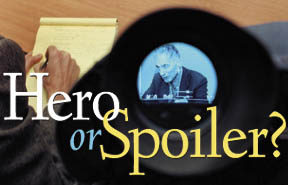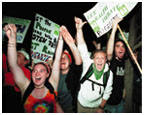|
February 7, 2001: Features
By Louis Jacobson '92 Ralph Nader '55 inspired great passions during his 2000 presidential bid. Now 66, the legendary liberal crusader and two-time presidential candidate was cheered by supporters in auditoriums across the country but vilified by Democratic partisans for tipping the race from Al Gore to George W. Bush. Nader, though he garnered almost 2.8 million votes, ultimately failed to take 5 percent of the votes cast, his long-stated benchmark. On November 27, 2000, PAW contributor Louis Jacobson '92 interviewed Nader at his campaign headquarters, located in a modest townhouse on the northern fringe of downtown Washington. Following are lightly edited excerpts from his hour-long interview with Nader. The full text is available online at www.princeton. edu/~paw. Do you consider your campaign this year to have been a success or a failure, and why? I consider it a success because we now have in place the third-largest party in the U.S., replacing the Reform Party, as well as the fastest-growing party and the party that we think is first in its spirit of determination to take back our government for the people. What that means strategically for the other two parties is that no longer can they say, "You have nowhere to go because the other big party is worse." We also brought in a lot of young people - the campuses were alive with activity. We had coordinators on 1,000 campuses all over the country, and we brought a lot of adult voters back into politics as canvassers and organizers. And we generated a very strong debate within the liberal community, centered on the pivotal question of whether we work to preserve the status quo against a worse alternative, or whether we work against the worst alternative by expanding the hope for justice in our country.
At least it's a debate now. The first leap forward occurred on November 7. We're hoping to field over 1,000 candidates for local state and national office in 2002. So it was a good baseline. On other hand, we didn't get the 5 percent we wanted, and there will be a lot of analysis of why that was. Our polls held up until the Monday before the election. I guess the scare campaign by the Democrats worked and got some of the wavering Democrats back into the fold. Do you have any regrets - things you might have done differently? Oh, yeah. That's the only way you learn. There isn't a politician who's credible that says he or she didn't make a lot of mistakes in the campaign. Well, one of them was that I started a little bit too late - I started March 1, and we didn't really have a staff going until about May or June. Second, we had a small amount of money to spend in the last three weeks, and I had wanted to spend it on hiring short-term people to get out the vote in key areas. I was persuaded to put it into television and radio. I think that was a mistake. Third, we had six people working full-time in front of a computer, going into major constituency groups that we thought might resonate with our agenda - agriculture, environment, labor. We know now that the Internet didn't increase the overall turnout. Now, to clarify: This was a 50-state campaign. It was not a campaign to defeat Al Gore, because if it had been, I would have focused on the swing states. As it happened, I spent more time in California, which was firmly in the Gore camp, than in all the swing states put together. I hardly campaigned in Florida. I was in Florida for three days since March. So it was a campaign to establish a Green Party presence in as many states as possible and to get as many votes as possible.
Being thrown out of the debate premises. It's one thing to be excluded from the debates, but I had credentials to be interviewed by the student television station at Washington University [in St. Louis]. In Boston, I had credentials to sit in an adjoining auditorium - an adjoining auditorium! - pursuant to a Fox News invitation to sit in a trailer and give them commentary at 11:00, after the debate. That was pretty astounding. So astounding that it's leading to litigation! Also, I don't think I got more than an infinitesimal amount of space or time on any of our agenda issues, which were very clear. If you look at our Web site, we made a big thing out of agricultural policy. Well, that's not a marginal issue in America. We were not talking about recommending a thorough investigation of the UFO phenomenon. . . . In the last three weeks of the campaign, when all I heard was about how I would be throwing the election to Bush, we never had more than four reporters with us. Did the experience of the campaign make you more or less interested in pursuing your goals through electoral politics, as opposed to what you have traditionally done with interest groups? More. Simply because for the last decade or so, the citizen groups have been crowded out in Washington. They can't get anything done compared to what they did in the 1960s and 1970s. About 1980 it started to slide. Ronald Reagan was one factor, but also [former Representative, D-California] Tony Coelho teaching the Democrats how to raise money from big business interests. That was one of the things that prompted me to run. Are you going to continue to work through your outside groups too? Oh, yeah. Sure. Truly deep down in your heart, did you not care who won the election, as long as it wasn't going to be you? I didn't care. You've been around this city long enough - you know there are fewer and fewer decisions that are not made by the permanent, corporate government here, represented by corporate lobbyists, political action committees, and the whole corporate infrastructure. I say to myself that the real issue is which candidate is going to dislodge the permanent corporate government in Washington once they get into office. There is no clear answer to that from Bush or Gore. Was the campaign fun for you? Yeah. A long time ago I realized that if something was important to do, you made it enjoyable. Otherwise every day you'd be fighting yourself. What do you tell people who say you cost Gore a victory? I tell them, first of all, that Gore ran a terrible campaign, and that he should have won in a landslide over the bumbling Republican governor from Texas with the terrible record. Then I say that there are at least a half-dozen what-ifs, and I'm only one of them. If you had to do it over again, would you have wished that 1 percent of your voters in Florida had switched to vote for Gore, so that he could have won a clean victory? No, because you have to be loyal to your supporters. I wasn't running in order to help elect another candidate, however determined the Democrats were, and are, to confer that on me. You run to take as many votes as possible from all the other candidates. It's axiomatic. Somehow, they thought lurking behind my candidacy was a desire to undermine my candidacy! It was as if they were entitled, instead of having to earn those votes. Going forward, will you have a titular position with the Green Party? Oh, just symbolic. I don't want to get involved inside the Green Party, because I think a party has to have two focuses. One is inside, working out all the problems, et cetera, and two is the outside face. I want to be that extroverted face. I'm an independent voter, I've always voted independent. The Greens have to begin appealing, big-time, to independent voters. What is your official stance on whether you might run again in 2004? I won't decide that until
much later. Louis Jacobson '92, who was among the first class of summer interns for the Nader-inspired Princeton Project 55, covers politics and lobbying for National Journal in Washington.
|
||


 Do
you think you've won that debate?
Do
you think you've won that debate? What
surprised you about the campaign?
What
surprised you about the campaign?